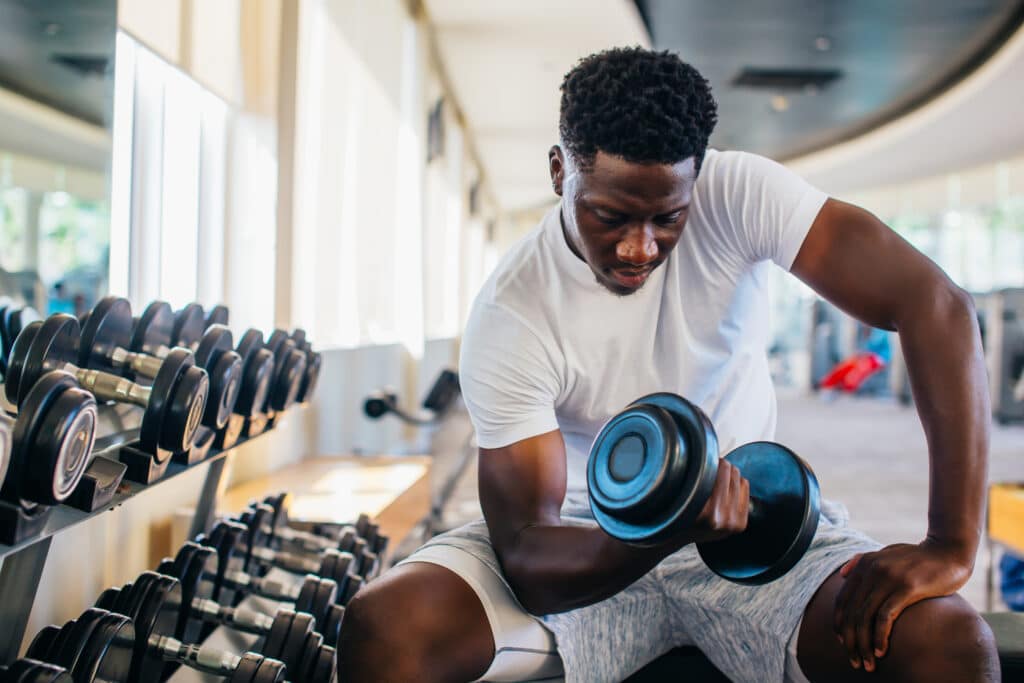Get answers to questions like “what is testosterone replacement therapy?” and “do you recover faster on TRT?”
As men age, they experience a decrease in testosterone production. Some will turn to testosterone replacement therapy (TRT) to restore balance and eliminate the associated symptoms of this condition. But what does TRT really do? Do you recover faster on TRT?

Testosterone is a hormone that plays a vital role in the development and maintenance of masculine characteristics. When testosterone levels are low, it’s called male hypogonadism.
It can lead to health issues such as:
TRT involves supplementing the body with synthetic testosterone to bring levels back up to normal. There are several ways to administer TRT, including injections, patches, and gels.
TRT has gained popularity over the years due to its numerous benefits. Many men opt for TRT for many reasons.
Lower testosterone levels can cause a drop in energy levels, fatigue, and lack of motivation. But, by increasing testosterone, TRT helps the body produce more red blood cells, which are responsible for carrying oxygen throughout the body.1
TRT can help increase muscle mass by improving the creation and synthesis of protein in the body, which is essential for muscle growth.
It helps to improve endurance, making it easier for people to engage in physical activities that can contribute to building muscle mass and strength.
By restoring optimal testosterone levels, TRT helps to increase energy levels, reduce fatigue, and improve physical performance. This leads to a more toned and muscular physique.2
TRT can strengthen bones by stimulating bone growth and minimizing bone loss, particularly in men over 50. Osteoporosis is a condition characterized by weakened bones caused by low bone density. It’s a common health risk for men as they age.
Low testosterone levels have been linked to depression, irritability, and fatigue. TRT has been shown to improve these symptoms, leading to an improvement in overall mood and quality of life.
Recovering from an illness or injury can be a challenging and often frustrating process.
The increase in testosterone TRT provides can aid in the recovery process by:
Testosterone can affect the prostate gland. In some cases, TRT may worsen existing prostate conditions or increase the risk of prostate cancer.
Regular monitoring of prostate-specific antigen (PSA) levels and regular prostate examinations are often recommended for people on TRT.
TRT may not be recommended for some people if they are working to recover from prostate cancer or other illnesses involving prostate health.7
TRT can disrupt the body’s natural production of hormones. This leads to imbalances in testosterone and other hormones.
This can result in potential side effects such as:
Close monitoring and regular blood tests are necessary to ensure hormone levels remain within a healthy range.
Hormonal imbalances can also affect the recovery process for some people, making it important to frequently check in with your doctor.
TRT can stimulate the production of red blood cells, leading to a condition known as polycythemia.
Excessive red blood cells can increase the risk of blood clotting, which can be dangerous depending on the person and what kind of injury they may be recovering from.
Regular blood tests are necessary to monitor hematocrit and hemoglobin levels to prevent complications.
When a person receives exogenous testosterone through TRT, it can suppress their body’s natural testosterone production. This can result in testicular shrinkage and diminished fertility.
If TRT is stopped abruptly, it may take time for the body to resume natural testosterone production.
Depending on the type of illness or injury, this aspect of TRT can be of concern to certain people.
It is crucial to have a comprehensive discussion with a healthcare provider who specializes in hormone therapy. They will assess the potential risks and benefits of TRT in your specific situation, especially if you’re taking it during recovery.
Do you recover faster on TRT? TRT may be beneficial for people recovering from injuries or surgeries in certain cases.
But, the decision to use TRT should be made on an individual basis, considering various factors and under the guidance of a healthcare professional.
Below are some of these considerations.
By maintaining muscle mass and strength, TRT may help in the recovery process.
Physical therapy focuses on restoring and improving physical function through targeted exercises, manual techniques, and other modalities.
It can help in the recovery from injuries or surgeries by improving:
A balanced and nutrient-rich diet can play a significant role in the recovery process. Working with a registered dietitian or nutritionist can help develop a personalized meal plan that supports healing and provides optimal nutrition during recovery.
Injuries or surgeries can be emotionally challenging. Counseling, therapy, or support groups can help people manage stress, anxiety, and depression during the recovery phase.
Chiropractic care focuses on the diagnosis and treatment of musculoskeletal disorders, primarily through manual adjustment and manipulation of the spine.
It can be beneficial in:
These practices can aid in relaxation, stress reduction, and improving flexibility and strength.

Immortal Male is a concierge-guided testosterone replacement therapy subscription that helps men 40 and older maximize their testosterone levels.
TRT can help:
If you’re looking for support and a way to help replace your testosterone levels, Immortal Male is here to help. We can answer any questions you may have and will support you every step of the way during TRT.
Immortal Male is an online clinic that helps men optimize their hormones.
As part of your membership and as medically indicated, physicians prescribe medications, and recommend supplements that are delivered to you from the comfort of your home.